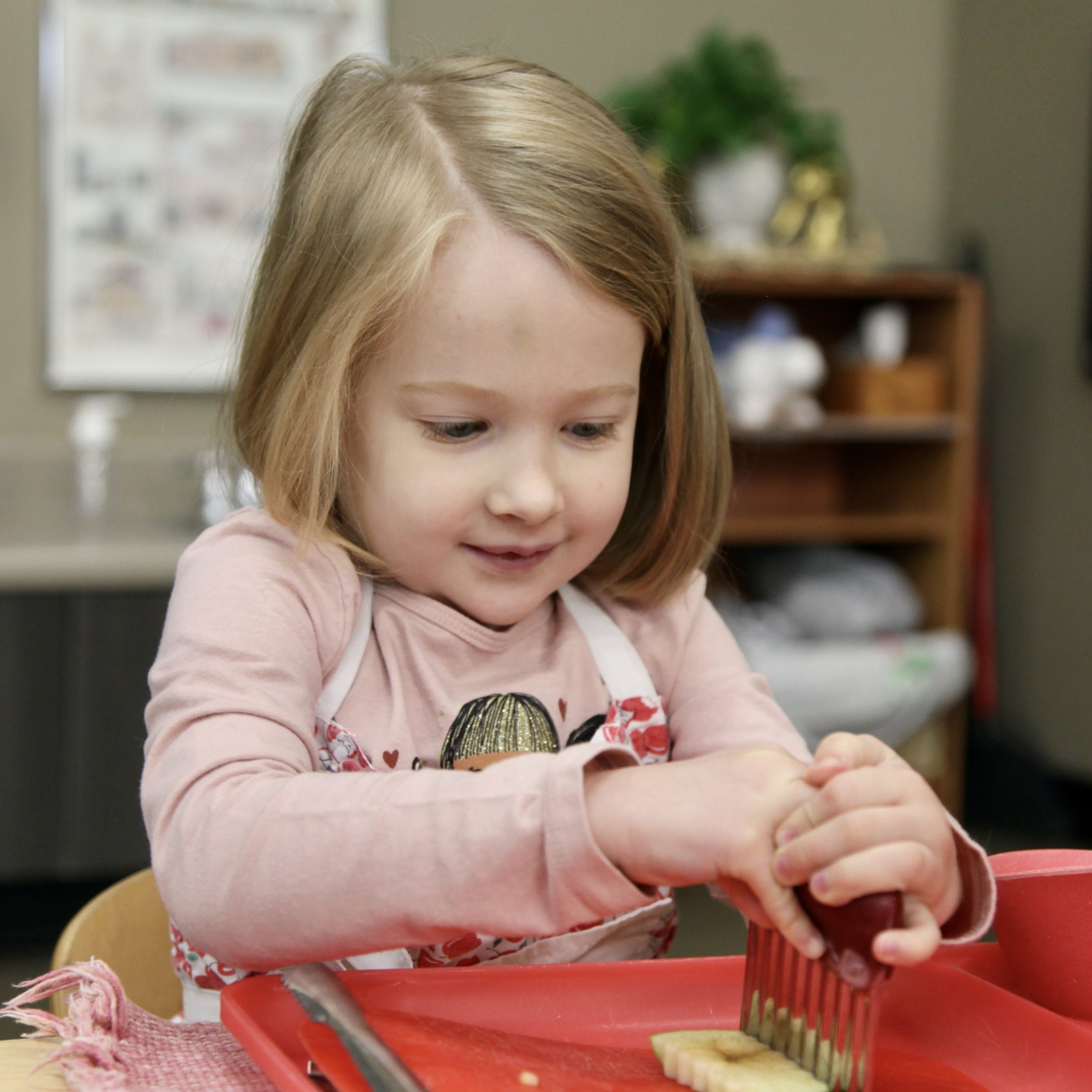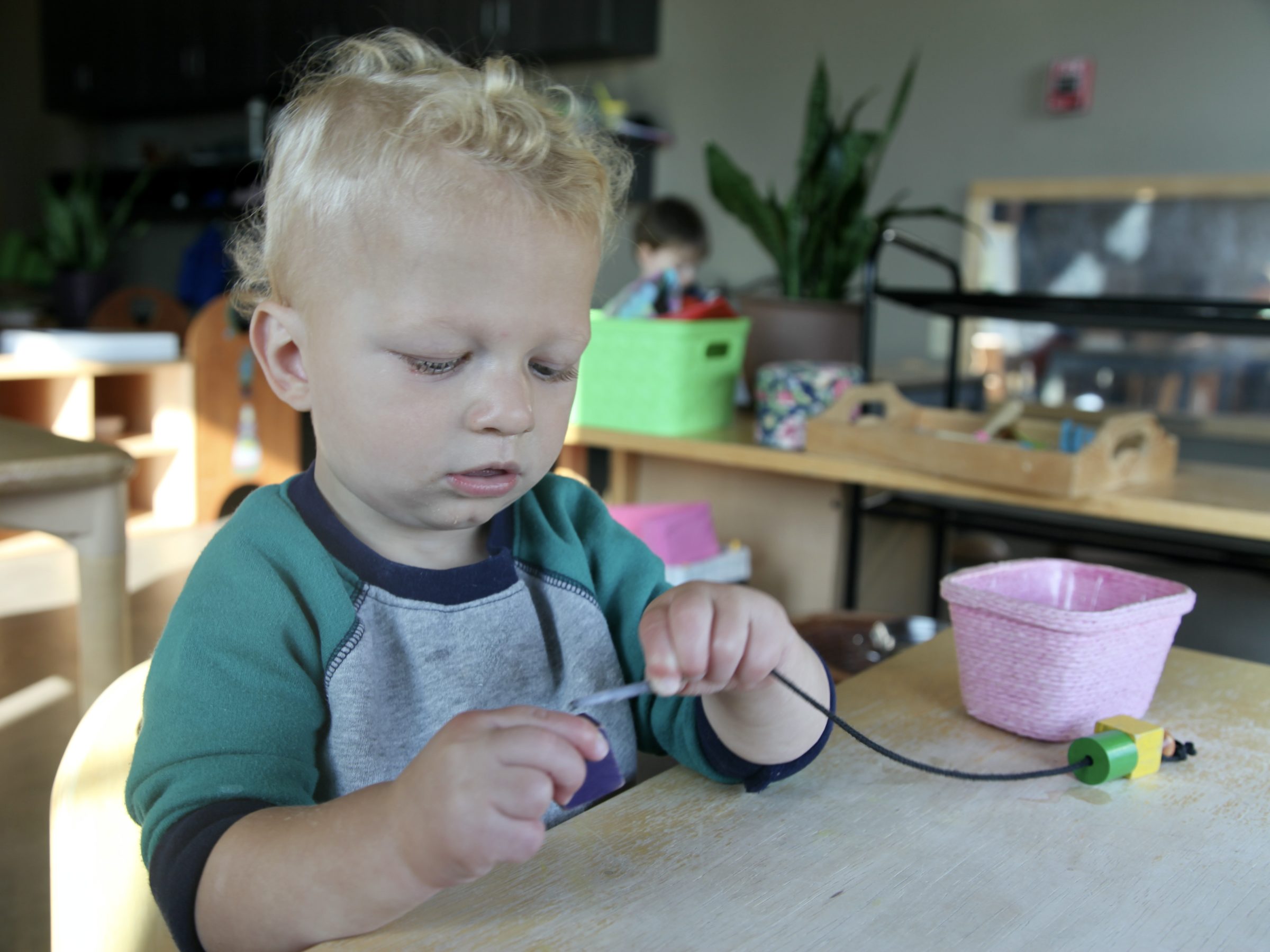Saying “No” With Love
Podcasts
For a podcast of this post, scroll to the bottom of this page or subscribe on iTunes.
We try really hard to avoid saying “no.” It doesn’t feel good to say or to hear. Many of us grew up hearing no a lot and we didn’t like the way it made us feel (unimportant, silenced) or the things it made us do (sneaking out, lying). It doesn’t feel in-line with Montessori, it doesn’t feel respectful. We avoid it at all costs. We even find ourselves engaging tactics we never expected to, or wish we didn’t, in order to avoid “no.” We “redirect” in the form of distractions. We try to convince a two-year-old to change their mind. We engage in or give in to a power struggle, using terms like “fight,” “battle,” “ditch to die in,” all to dance around “no.”
On paper and in our imaginations, if I follow all the rules everything will be perfect. If I follow the child, all their needs will be met, and we will cheerfully all get along. If I prepare my child for what is to come, they will want to do it. If I am patient, they will never lose their temper. If I hustle, everything will be perfect.
We forget about a few important aspects. These are children, not computers. I can follow a path, a, b, c, d, and a child still has emotions and opinions. Parenting is not coding — I might get a very unexpected answer, even if I do everything “right.”
We’ve never had cookies for breakfast, or even purchased chocolate milk. That does not stop a child from asking for it rather than eggs and fruit for breakfast. We go to Target frequently, and we only pick a new toy as a gift — for ourselves or for others. That doesn’t mean a child won’t ask, or even have a tantrum in the aisle when they are reminded of this fact. We always go home after the park, we talked about what we’re going to do when we go home, and I remembered to set a timer and give the reminder, “this is the last slide before it’s time to gather our belongings!” And yet, “pleasepleasepleasepleaseplease just ONE more!” followed by even one more, and trying to sneak in one more.

It’s so easy to wonder, what am I doing wrong? Absolutely nothing! Testing limits is normal and natural. There’s a great analogy: what do you do when you get on the roller coaster and the safety bar clicks into place? You push on it. Has it ever given way? Nope. Do you even hope it gives way? Absolutely not. Well, better here where it’s safe, but if it did, would you ever feel safe getting on a roller coaster ever again?
This is what limit enforcement is: safety. At the end of the day, as adults our primary responsibility is physical and psychological safety. When a limit is fluid, when we don’t mean what we say, we are sending the message that we’re not in charge, we’re unreliable. When I don’t mean what I say when I say, “it’s time to put toys away,” or “you can pick three books,” do I mean what I say when I say, “I’ll always come back to pick you up,” or “I promise you’ll be safe.” These examples seem rather dramatic, but children trust us, and everything we say is value-neutral. If we don’t mean what we say in one situation, how can we expect children to trust a different situation, how are they to know when we “mean it?”
There are some lessons which are just too catastrophic or detrimental to learn from, some where the “learning” is too big for a child at this time. I know I’ll feel like garbage if I eat poorly, that’s a learning experience I can actually learn from. Whether or not I do learn is up to me. A child isn’t ready for this cause-and-effect. They won’t realize, when I eat sugar cereal for breakfast, I don’t have the energy to play with my friends, and I make bad choices, and I feel crabby all day; I’d better not do that. It’s up to us to protect them from this experience through nutrition, rest, and care. The same is true for running in the street. When a child won’t walk in the parking lot, it feels unpleasant to hold their hand, especially when they’re insistent that this time, they’ll walk, promise. Then they run, cause this is a fun game. We hold hands firmly, we carry a wriggling child, silently begging passers-by not to judge us for being mean when this child is wailing, “I want to walk! I promise I’ll walk! I promise I’ll be good!” There is no good or bad. It’s testing the limit and hoping it will not fail.
We encounter “no” all the time. A red light. Feeling unwell after eating that sugar cereal. Less money in our bank account than we’d like. An injury in the kitchen. A disagreement with a friend or colleague or employer. We do not get what we want all the time, because we live in community, in relationship with one another, and we function with balance — sometimes I get what I want, sometimes you get what you want, sometimes these are at odds with one another, sometimes they’re in line with one another, but if we juggle this balance carefully, we all win.
“It’s less a formula and more a dance.”
Some children respond easily to limits, others push back every minute they’re awake. Some children hear the options offered and joyfully pick one, others will look for another choice even when the options provided are favorite and more favorite. Even within the same family, there are personalities and undercurrents and what isn’t said and nuance. We might do everything “right,” and the most cooperative child is getting sick, or tired or hungry, or figuring out their words have power, and responds with “no.” Even as much as we try to avoid saying no, it’s an important message, and one a child is navigating, as well.
It’s less a formula and more a dance. When do I offer choices and when is this the only choice? What do I know about this child and what is my goal? When do I really mean “no?” When am I willing to say that? When “no” is as legitimate an answer as “yes,” when it’s a message we will hear throughout the day and throughout our lives, when my mandate is safety above all else, how do I become comfortable with the discomfort of “no?”
We pause, reflect, we say what we mean and we follow through. We give space for decision making and we set limits. Do you want me or your mom to put you to bed? No. You can choose or I can choose. No. Tonight, I will put you to bed. I am so glad I get to be the one to tuck you in. We can practice choosing again tomorrow.
Just like making choices helps children learn to navigate the consequences of those choices, we navigate these consequences, too. The consequence of tears, of negotiation tactics, of feeling uncomfortable or mean, these are all the consequences of following through. They’re sometimes unpleasant, but it’s important to remember: it doesn’t mean we’re doing anything wrong. Other consequences of following through are reliability, trust, a secure relationship. A teen or an adult child coming to their parent for advice or support. Knowing boundaries are secure, reliable, and consistent, and having more freedom, choice, and opportunity within those boundaries.

Sometimes the answer is “no.” When I can see the consequences unfolding and they are not healthful, in line with our family values, or in fact dangerous, I am obligated to say no. Even when I give choices and set a child up for success, this isn’t always easy or pleasant to hear. Some examples are non-negotiable bed time, what our family eats, or playing in the street. These cannot be learning experiences, sometimes because a child isn’t yet capable of that kind of learning “See, I told you you’d be tired. Maybe tonight you won’t fight me on bed time.” or because the learning is just too catastrophic, such as playing in the street.
In these situations, maybe we have the foresight and the bandwidth to give options, such as “would you like me or Mom to tuck you in?” “Different families make different choices. We choose to eat vegan. Would you prefer tofu or beans in your lunch today?” “You can play in the driveway or in the backyard.” Hopefully we also have the strength, patience, and courage that comes with knowing, we’re not being mean. Love sometimes means saying “no.”
Written by:
Charlotte Snyder




